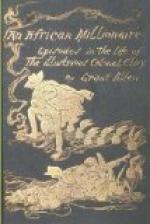“You Sir Charles Vandrift!” the rogue cried. “No, no, sir, you are a madman!” He looked round at the police. “Take care what you do!” he cried. “This is a raving maniac. I had business just now with Sir Charles Vandrift, who quitted the room as these gentlemen entered. This person is mad, and you, monsieur, I doubt not,” bowing to me, “you are, of course, his keeper.”
“Do not let him deceive you,” I cried to the police, beginning to fear that with his usual incredible cleverness the fellow would even now manage to slip through our fingers. “Arrest him, as you are told. We will take the responsibility.” Though I trembled when I thought of that cheque he held of mine.
The chief of our three policemen came forward and laid his hand on the culprit’s shoulder. “I advise you, M. le Colonel,” he said, in an official voice, “to come with us quietly for the present. Before the juge d’instruction we can enter at length into all these questions.”
The Colonel, very indignant still—and acting the part marvellously—yielded and went along with them.
“Where’s Medhurst?” Charles inquired, glancing round as we reached the door. “I wish he had stopped with us.”
“You are looking for monsieur your friend?” the landlord inquired, with a side bow to the Colonel. “He has gone away in a fiacre. He asked me to give this note to you.”
He handed us a twisted note. Charles opened and read it. “Invaluable man!” he cried. “Just hear what he says, Sey: ’Having secured Colonel Clay, I am off now again on the track of Mme. Picardet. She was lodging in the same house. She has just driven away; I know to what place; and I am after her to arrest her. In blind haste, MEDHURST.’ That’s smartness, IF you like. Though, poor little woman, I think he might have left her.”
“Does a Mme. Picardet stop here?” I inquired of the landlord, thinking it possible she might have assumed again the same old alias.
He nodded assent. “Oui, oui, oui,” he answered. “She has just driven off, and monsieur your friend has gone posting after her.”
“Splendid man!” Charles cried. “Marvillier was quite right. He is the prince of detectives!”
We hailed a couple of fiacres, and drove off, in two detachments, to the juge d’instruction. There Colonel Clay continued to brazen it out, and asserted that he was an officer in the Indian Army, home on six months’ leave, and spending some weeks in Paris. He even declared he was known at the Embassy, where he had a cousin an attaché; and he asked that this gentleman should be sent for at once from our Ambassador’s to identify him. The juge d’instruction insisted that this must be done; and Charles waited in very bad humour for the foolish formality. It really seemed as if, after all, when we had actually caught and arrested our man, he was going by some cunning device to escape us.
After a delay of more than an hour, during which Colonel Clay fretted and fumed quite as much as we did, the attaché arrived. To our horror and astonishment, he proceeded to salute the prisoner most affectionately.




